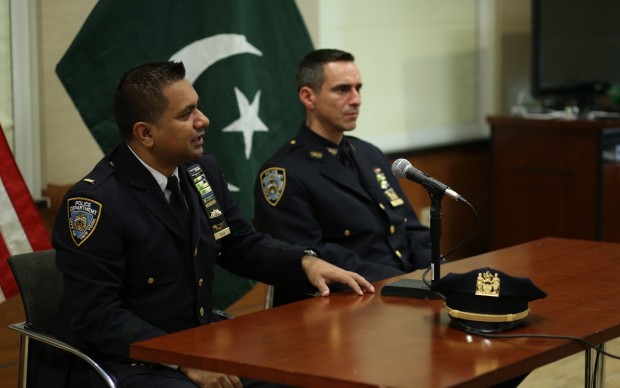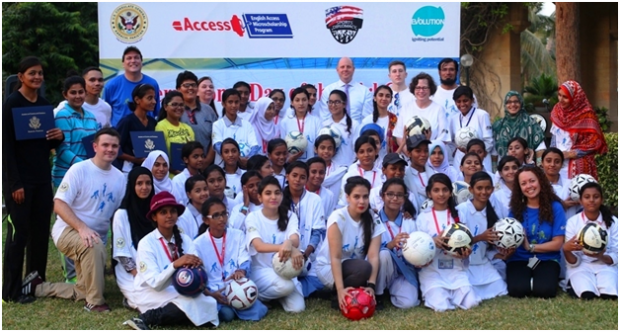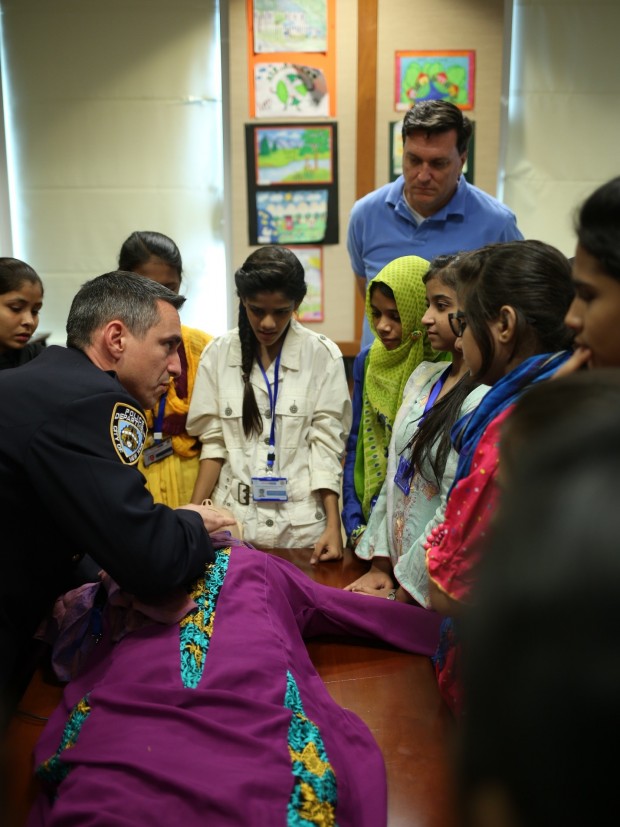
Extending cooperation between the US and Pakistan

Besides extending cooperation and granting huge funds for projects in different sectors in Pakistan, the U.S diplomats have been maintaining close liaison with educational and cultural institutions as well as the intellectual circles and holding cultural events across Pakistan.
The very purpose of such efforts is to let the people of Pakistan know more and more about United States and bringing a positive change in their outlook. For achieving this goal, the U.S had initiated Exchange Programs arranging the visit of students and media professionals to the United States several years back, which still continues, but very recently, the U.S Consulates in Pakistan have launched websites in local languages to disseminate information to the general public in their own language.
One such website was officially launched by Mr. Brian Heath, U.S Consul General in Karachi, which is the Consulate’s first-ever Sindhi language website to ensure dissemination of information in local language to the general masses of southern Sindh province. In addition, Sindhi musicians performed at the event, which was also designed to showcase Sindhi culture.
“We are very proud and excited to launch our first-ever Sindhi language web site,” said Mr. Heath. “This follows on the successful launch of Mission Pakistan’s Urdu language website a month back.” U.S. Consulate Karachi, he added, has been issuing press releases, posting on Facebook and tweeting in Sindhi for more than a year.
“Having Consulate Karachi’s website completely in Sindhi, is an important step in helping us reach out to the 60 million Sindhi speakers in both Pakistan and overseas. Now, they will be able to read about the Consulate’s activities and assistance efforts in one of Pakistan’s oldest and most important languages.” The Consulate, he said, wants Americans and Pakistanis to “get to know each other better.”
Meanwhile, the U.S. Agency for International Development (USAID) and Sindh Education and Literacy Department also signed memorandums of understanding (MoU) with Engro Corporation to improve education in Sindh.
“The Sindh government and our corporate partners have shown great leadership in implementing U.S. funded education projects,” said U.S. Consul General Brian Heath. “The collaboration will go a long way toward making education more accessible to children in Sindh.”
USAID Pakistan is helping the Sindh Education and Literacy Department implement the USAID Sindh Basic Education Program (SBEP). This includes constructing 120 large public schools in seven districts of the province, and five towns in Karachi. Under the tripartite agreement, Engro under its “I am the Change” initiative will help generate funding for SBEP schools.
“This is exactly the kind of cooperation that we need from stakeholders in all areas – government, private sector, and civil society,” said USAID Mission Director to Pakistan, John Groarke.
A two-member delegation consisting of Lieutenant Adeel Rana and Detective Elvis Vukelj of the New York Police Department also visited Karachi, the capital of Sindh province and provided safety tips to 50 girl students at an Access English-language Micro-scholarship program in Karachi.
“Giving citizens the tools they need to stay safe is a key element of community policing,” said Vukelj. “It is an especially important skill for young people.”
The Access Micro-scholarship program is about more than just English grammar and language skills, said Cultural Attaché Griffin Rozell. “We want to share American culture and pass along valuable life skills as part of the program’s enrichment activities,” he said.
According to Rozell, the New York Police Department is an American icon. “We wanted to give our Access students the chance to interact with these officers, while learning practical skills,” he said.
The United States, having diplomatic relations with Pakistan since its creation in 1947, continues enhancing its cooperation to this South Asian nation in different fields such as energy, economics, counterterrorism, defense, strategic stability and education, especially after 9/11 tragic incident that took place one and half a decade back.
Pakistan, in fact, had been extending its full cooperation to the United States in the War on Terror since September 11, 2001, attacks in the USA by Al-Qaida resulting in closer coordination between them on security and stability in South Asia.
“Pakistan has generally cooperated with the United States in counterterrorism efforts and since 2001, has captured more than 600 al-Qaida members and their allies, and the United States maintains a strong security partnership with Pakistan,” the US authorities admitted in a Fact Sheet released recently.

Bilateral Trade
According to Fact Sheet the United States is Pakistan’s largest bilateral trading partner. In FY 2015 (July 2014 – June 2015) $18.72 billion was remitted back to Pakistan by overseas workers, 14.4% from the U.S. It is estimated that at least 500,000 members of the Pakistani Diaspora reside in the United States. In FY 2015, the United States accounted for approximately 16% of Pakistan’s exports, the second largest market behind the European Union, and $1.20 billion of its imports. Bilateral trade between the United States and Pakistan exceeded $5.1 billion in FY 2015. The United States is also one of the top sources of foreign direct investment to Pakistan, with $209 million in FY 2015. Pakistan has taken steps over the years to liberalize its trade and investment regimes, either unilaterally or in the context of commitments made with the World Trade Organization (WTO), the International Monetary Fund (IMF), and the World Bank.
In May 2014, following Prime Minister Sharif’s visit to Washington, the U.S. and Pakistan established a Joint Action Plan to expand bilateral trade and investment over five years. In March 2015 the United States and Pakistan organized the third U.S.-Pakistan business opportunities conference, headlined by Secretary of Commerce Penny Priztker and Finance Minister Ishaq Dar in Islamabad.
Major U.S. investments are concentrated in fast-moving consumer goods, construction, chemicals, energy, transportation, and communications.
U.S Civilian Assistance to Pakistan
After the passage of Enhanced Partnership with Pakistan Act, often referred to as “Kerry-Lugar-Berman,” or “KLB,” in October 2009 to demonstrate the U.S. long-term commitment to cooperation with the Pakistani people and their civilian institutions, the U.S. government has committed over $5 billion in civilian assistance to Pakistan, and also over $1 billion in emergency humanitarian assistance for disasters like the 2010 floods.
U.S. civilian assistance to Pakistan facilitates cooperation fostering a more stable, democratic, and prosperous Pakistan and region, which is in the interest of both countries. It is focused on five priority areas: energy; economic growth, including agriculture; community stabilization of underdeveloped areas vulnerable to violent extremism; education; and health. These priorities were determined in consultation with the government of Pakistan. The U.S. implements programs with Pakistani partners, including the government of Pakistan, civil society, and private sector actors, to increase local capacity and promote sustainability of efforts. To date, U.S. contributions have added over 1,600 megawatts to Pakistan’s electricity grid through infrastructure upgrades, rehabilitation, and policy consultation; led to the launch of the Pakistan Private Investment Initiative (PPII), which will provide seed funding to small- and medium-sized enterprises in Pakistan; built or reconstructed roughly 1,000 schools; and funded about 1,100 kilometers of roads in the Federally Administered Tribal Areas (FATA) and Khyber Pakhtoonkhwa.

In January 2015 the U.S. pledged $250 million to help Pakistan facilitate the relief, reconstruction, and return of FATA communities displaced by counterterrorism operations.
U.S Security Assistance to Pakistan
U.S. security assistance to Pakistan is focused on strengthening the counterterrorism (CT) and counterinsurgency (COIN) capabilities of the Pakistan security forces, and promoting closer security ties and interoperability with the United States. U.S. security assistance has directly supported Pakistan’s CT operations in the FATA. Foreign Military Financing (FMF) ($265 million in FY 2015) promotes the development of Pakistan’s long-term COIN/CT capabilities, particularly in FATA, and improves Pakistan’s ability to participate in maritime security operations and counter-maritime piracy. International Military Education and Training (IMET) assistance to Pakistan ($5 million in FY 2015) enhances the professionalism of Pakistan’s military and strengthens long-term military relationships between Pakistan and the United States.



